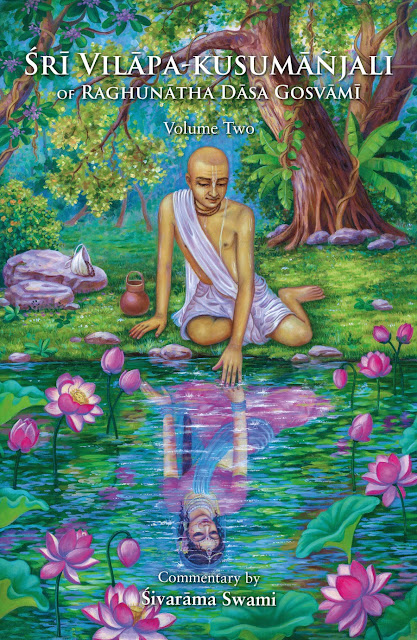Okay,
here is a final question from Mahimārnava.
She
says,
Jaya and Vijaya could not realize how elevated
the Kumāras were, and so they prevented them from entering the gates of Vaikuṇṭha.
What could they represent and what can we take from them in our own lives?
Well,
the spiritual perspective is that Jaya and Vijaya were not at fault. Brahma-saṁhitā
talks about how Brahmavādīs, Māyāvādīs and others can not enter into Vaikuṇṭha and
there are these śūlaiḥ, I forget, those three ponged spears, tridents. There
are tridents in all the directions keeping away any unauthorized person who
tries to get into Vaikuṇṭha. So, this is in the very beginning of Brahma-saṁhitā.
(BS 5.5)
So, Jaya
and Vijaya were right. Kumāras were not devotees, they did not have prema,
they were Brahmavādīs, they knew about the Lord and that is why they wanted to
see him, but they really were not qualified. And moreover, spiritually
speaking, Jaya and Vijaya were more elevated, they were associates of the Lord,
they were residents of Vaikuṇṭha, they had love for Lord Nārāyaṇa.
However,
Jaya and Vijaya were kṣatriyas and the Kumāras were pure brāhmaṇas.
So here there was a transgression, there was a social transgression, although
spiritually the Jaya and Vijaya were correct, socially they were not.
Now that
is an interesting paradigm, because, sometimes we would expect that the
spiritual is higher than the social. It is, but that does not necessarily mean
that you do not get any reaction for social misbehaviour.
And of
course, ultimately Lord Nārāyaṇa, when he comes out, he said, that, all this was done by my
arrangement.
So,
when he asked, well what can we learn from that, one thing that you certainly
can learn is, that regardless of the spiritual position, even if you are in a
more spiritually elevated state, if you offend someone who is in a higher
state, especially pure brāhmaṇas, then you will still get the reaction
for that.
And of
course, Jaya and Vijaya got that reaction, that they had to take birth as
demons three times, which was not really a very pleasant thing. So, reaction
will be there. And the Kumāras, well, of course anybody who is also looking for
liberation, they should learn, that with liberation you are not going to get
into Vaikuṇṭha.
The Kumāras
became devotees when Lord Nārāyaṇa appeared and they bowed down before him and by
smelling the Tulsi leaves on his load of feet they became devotees, so very
famous list one that does not come to mind immediately. So, it was only then
that they actually got the qualification.
So an interesting
situation, spiritually you may be right, but if you are socially wrong you are
still going to get a reaction. So best thing is to be both - spiritually right
and socially right.
But of
course, Jaya and Vijaya slipped up on the social position. They were though
quite, can I say, arrogant in terms of the way they dealt with the Kumāras. They
could have spoken much sweeter language and being much more considerate. And that
is where really the Lord's arrangement comes in. And the result of that is that
taking this position of becoming antagonistic, because he does not want to
fight with a non-devotee, what does that mean?
Well,
if you are fighting, you are really at close quarters and you are constantly
having bodily contact. But demons can not have bodily contact with Kṛṣṇa. So
that means that if you wanted to have devotees who were actually pure, although
interestingly, they commit so many atrocities and sinful activities, stopping
all sacrifices, killing brāhmaṇas and they do really far out things.
On the
other hand, they are getting a certain spiritual benefit. What is the spiritual
benefit to Jaya and Vijaya get? Well, their absorption in Lord Nārāyaṇa or Lord
Viṣṇu is deeper as a demon, than as they are as a devotee. Nārada Muni speaks
about that in the seventh canto that I am envious of the demons who so absorbed
in thought. Of course, they are not absorbed in thought favourably, but
nonetheless, they are very deeply absorbed and it is a very powerful type of
meditation.
So,
very interesting questions, interesting situation.
Hare Kṛṣṇa.

.jpg)


